Clifford Garstang's Blog
September 25, 2025
New York, New York

I recently spent a few days in New York City. I’ve been meaning to get there again—I hadn’t been since before the pandemic—but the timing never worked out. Then I joined the Board of Directors of a non-profit organization that just happened to be holding a meeting in the city, providing a perfect excuse to make the trip. (I could have attended by Zoom, but it was my first meeting with this Board, and I wanted to be there in person.)
For trips north along the East Coast, I prefer to take the train. From central Virginia to Washington, Baltimore, Philadelphia, or New York, it’s an easy trip and brings you into the center of those cities, rather than a distant airport. The trip to Penn Station in New York is a little over six hours, and with WiFi on board, the time passes quickly. Since my last trip to the city, the station’s Moynihan Arrival Hall has opened, and it is fantastic—a huge improvement.
My hotel on busy 42nd Street in the Hudson Yards area of Hell’s Kitchen was about a twenty-minute walk from the train station, but it was a nice day so I didn’t mind. After getting settled, I ventured out to the nearest subway station to make my way to the Upper West Side to meet some old friends (we hadn’t seen each other in 35 years) for dinner. Dinner was fantastic, and I even enjoyed the trip on the subway. One of my favorite things to do in a big city is explore public transportation, and New York’s new-ish “Tap and Go” payment system makes it much easier than it used to be for visitors.
The next day, I decided to camp out at a coffee shop to get some work done. I had printed some pages from my work-in-progress and planned to spend the morning editing. I found a small coffee shop on 42nd Street, got a large coffee, and began working on the pages. After a while, a man at the next table leaned over and asked if he could ask me something. He was curious whether the editing I was doing was on someone else’s work or my own, and did I prefer to edit by hand or on a computer? I explained that I was traveling and so editing by hand was a necessity, but indeed I do usually reach a point where I like to print out the work to see it on the page rather than the screen. I noted that he was writing in a journal, and he acknowledged that he was an actor and writer. I also noted that he was wearing a UVa sweater, and it turned out his family lived in Charlottesville, although he had gone to college “out West,” and had been in New York for sixteen years. He introduced himself as Chris and went on his way.
While in New York, I saw two plays, neither of which grabbed me. Art by Yasmin Reza was a revival of a play that first ran on Broadway in 1998. This production featured Neil Patrick Harris, Bobby Cannavale, and James Corden, so it was extremely well performed (Corden was especially funny). Oh, Mary!, which has gotten great reviews and was recommended to me by many people, was a disappointment. I thought it was silly and crude. I suppose I’m glad I saw it, since so many people were talking about it, but I don’t need to see it again.
I also managed to get to three museums. The first was the Neue Galerie on the Upper East Side. It is a terrific small museum featuring Austrian art (including Klimt and Schiele paintings I admired) and currently has a special exhibit of German Expressionist paintings. Also, on the ground floor is a Viennese café where I met a friend for lunch, so that was fun. I was going to my Board meeting on Friday afternoon, so I squeezed in a visit to the Museum of Modern Art in the morning. I was at MoMA the year before the pandemic, when it was about to close for renovations, but it is stunning now. Then on Saturday morning, I was lucky enough to participate in a tour of a special exhibition at the Whitney Museum of American Art. The exhibit was work by deaf artist Christine Sun Kim, most of which dealt with the experience of being deaf. Because the pieces were mostly black and white and resembled New Yorker cartoons, one painter among us noted that they didn’t seem particularly interesting visually. While that’s arguably true, I thought the works raised important questions.
One of the highlights of the trip for me was a fantastic dinner with a friend in Koreatown at Kunjip. We had an enormous meal of Korean BBQ, seafood pancakes, a bean paste stew I really like, and countless side dishes.
I really can’t let so much time go by before I get back to New York!
Reminder of Goodreads GiveawayPlease remember to visit Goodreads to register to win one of 100 free Kindle copies of my novel, The Last Bird of Paradise. The Giveaway closes on September 30 and winners will be announced shortly after that.
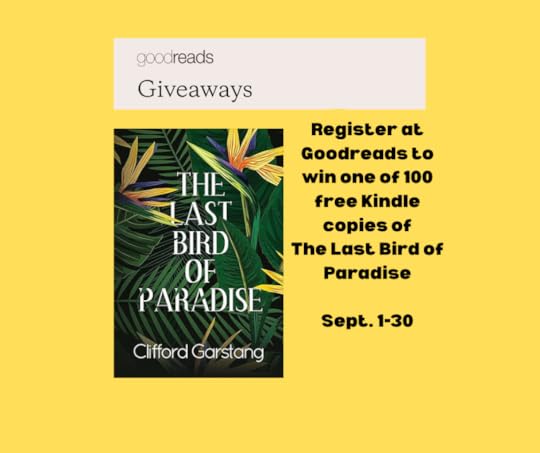
September 1, 2025
Goodreads Book Giveaway!
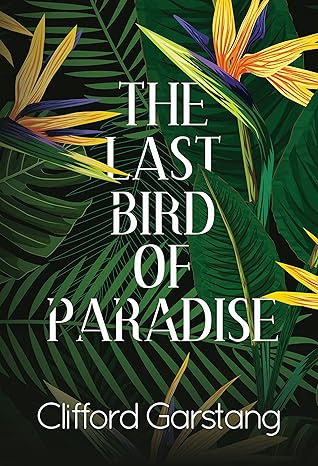 The Last Bird of Paradiseby Clifford Garstang
The Last Bird of Paradiseby Clifford Garstang
August 11, 2025
Living Globally: Stories from my International Life
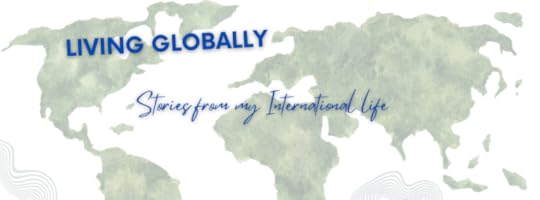
I have started a new series of short essays on my Substack Newsletter about my international experiences. Rather than repost those essays here, I invite you to subscribe (for free) to my Substack.
You can read past newsletters here.
August 4, 2025
I’ve Got Questions for Jann Alexander
Editor’s Note: This exchange is part of a series of brief interviews with emerging writers of recent or forthcoming books. If you enjoyed it, please visit other interviews in the I’ve Got Questions feature.
 What’s the title of your book? Fiction? Nonfiction? Poetry? Who is the publisher and what’s the publication date?
What’s the title of your book? Fiction? Nonfiction? Poetry? Who is the publisher and what’s the publication date?Unspoken: A Dust Novel, fiction, published July 3, 2025, by Black Rose Writing
In a couple of sentences, what’s the book about?TEXAS 1935. In a mythical town named Hartless in the Texas Panhandle, where nobody knows how to fix air you can’t breathe, one tenacious girl vows to stake her claim there — and face her unspoken fear.
What’s the book’s genre (for fiction and nonfiction) or primary style (for poetry)?U.S. Historical fiction, 20th century; women’s fiction; women’s action and adventure; coming of age
What’s the nicest thing anyone has said about the book so far?A reader commented on social media: “Spent a glorious day with Unspoken! Couldn’t put it down. Your writing is so immersive, I felt like I was right there with Ruby Lee and Willa Mae!”
What book or books is yours comparable to or a cross between? [Is your book like Moby Dick or maybe it’s more like Frankenstein meets Peter Pan?]Perhaps Oliver Twist by Charles Dickens meets The Women Could Fly by Megan Giddings
Why this book? Why now?There’s a commonly known Dust Bowl history about the Okies who went to California, thanks to Steinbeck’s Grapes of Wrath. But the hidden history of the double whammy that hit the Texas Panhandle, when dust storms raged and the Great Depression made millions destitute, is less told, yet has themes that echo today’s.
Upheaval, betrayal, family estrangement, families lost and found, homelessness, mass migration, and poverty are the themes we wake up to in today’s headlines. In the 1930s, during the Great Depression and Dust Bowl, things were no different. Because I hope my readers will find commonality with the characters I write, and from there, understanding, I hope they’ll also find empathy for those who walk the same paths today.
Other than writing this book, what’s the best job you’ve ever had?I absolutely adored my three-year stint as art director for the Washington Post Sunday Magazine, a weekly that often numbered 72+ pages, so in those three years I was responsible for 156 issues: the overall design, the cover art, the art and photo assignments for the features, plus art or photo assignments for the regular columns, in addition to the entire layout.
The assignment of art necessitated an understanding of the article, so I read stories ahead of publication, too, and even sometimes contributed an idea or headline or treatment when called for.
I’d worked for major ad agencies before this job, and I’d design many more magazines in the future, but this was a dream job at the Washington Post in the heady times Woodward and Bernstein held sway, with the legendary Ben Bradlee as the editor. It was the most exciting place to be and the melding of my creative talents was the most thrilling I’d ever experienced. Every Thursday at 7pm when the courier made his last call for pages to go to the printer was the most satisfying accomplishment imaginable…until the next Thursday at 7pm rolled around on repeat.
What do you want readers to take away from the book?I hope readers find the characters as captivating as I did when writing them, and that readers are buoyed by the indomitable spirits both daughter and mother possess as they face up to the worst the world can throw at them, and still persevere.
What food and/or music do you associate with the book?Woody Guthrie’s Dusty Old Dust (now more popularly known as So Long, It’s Been Good to Know Ya) is practically an anthem for Unspoken, which opens on Black Sunday 1935, when the worst black blizzard of dust hit Hartless, the mythical town in the Texas Panhandle, where the main characters have been struggling for five long years in drought and dust. The Dust Bowl Troubadour, Woody Guthrie himself, lived through that Black Sunday storm in Pampa, Texas, and wrote Dusty Old Dust about his experience. I have an entire DUST playlist dedicated to the music of the era, at Apple Music.
What book(s) are you reading currently?No surprise they’re historical fiction all: I’m loving The Secret War of Julia Child, by Diana R. Chambers; I just finished The Paris Express by Emma Donohue; and next, I can’t wait to start Sheltering Angel by Louella Bryant.
 Jann Alexander
Jann AlexanderLearn more about Jann on her website.
Follow her on Facebook, Instagram, BlueSky, YouTube, LinkedIn, Goodreads, BookBub
Buy the book from Black Rose Writing (the publisher), Bookshop.org, Amazon, Barnes & Noble, AppleBooks, GooglePlay, or Kobo
August 1, 2025
2025 Reading–July
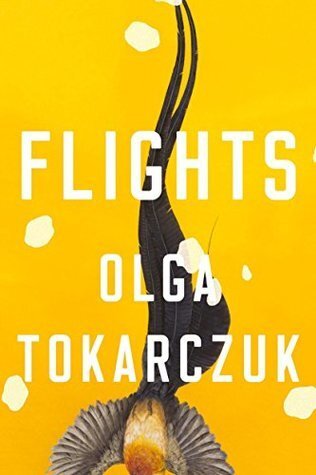
Flights by Olga Tokarczuk, translated from Polish by Jennifer Croft, is quite a book. I’ve had it on my shelf for a few years, purchased after the author, who is Polish, won the Nobel Prize. Before reading, I thought it was a novel, but it isn’t labeled as such. The book felt more like a large collection of shorter pieces, quite varied in length, connected by two intertwining themes of travel and the preservation of human specimens. The writing is powerful and fluid, and I’m still not sure what to make of it.

An African History of Africa: From the Dawn of Humanity to Independence by Zeinab Badawi was my book club’s selection for July. Even at 500 pages, a book with such a broad scope could not be expected to dig very deep, so it was no surprise that it was mostly a general overview. After all, it’s a huge continent with a wide variety of cultures and it covers a very long period of time. That said, I found it fascinating and filled with material I knew nothing or very little about. I’ve read other books over the years, including fiction, that touched on some of these subjects, but this book offered a bigger picture. I recommend it.
A Net to Catch My Body in its Weaving by Katie Farris won the 2021 Chad Walsh Chapbook Prize from the Beloit Poetry Journal. The poems are about illness and recovery and love, and I found them to be very moving, both heartbreaking and hopeful.
A Ghost in the Middle Kingdom: A Memoir by Anna Keibler is a quick read about a young woman goes to China and makes a series of bad choices about men and life in general. What’s somewhat interesting about the book is that it takes the reader to Jinan, a city in eastern China about halfway between Beijing and Shanghai, that one doesn’t often hear about. Even more intriguing to me is the time the author spends in Qinghai, a western province on the Tibetan Plateau, mostly tracking down her deadbeat boyfriend who is from there.
July 28, 2025
A Musical Summer

For the past several years, my summers have been exceedingly musical. Although the city near my rural home is small (population 25,000), it hosts two world-class classical music festivals in July and August. I am a regular attendee at both.
First up is the Heifetz International Music Institute Festival of Concerts. The Heifetz Institute is a six-week program for gifted young string players from around the world who come here to study with great teachers from some of the best conservatories in the country. Founded by violinist Daniel Heifetz (not to be confused with world-renowned Jascha Heifetz, who is a distant cousin) almost three decades ago, the Institute relocated to Staunton, Virginia in 2012, housed on the campus of Mary Baldwin University.
Over the course of the six weeks, the Institute produces a mind-boggling number of concerts, somehow averaging more than one a day. These range from evenings featuring students in the senior division (ages 14 and up) performing solo works, to the same students collaborating in chamber ensembles, to performances by students in the junior division (ages ranging from 7 to 14). Use of the term “student” is deceptive, if accurate, because many of these young performers are spectacular talents well on their way to careers as professional musicians.
In addition to the student performances, one night per week is devoted to concerts presented by faculty members. At a recent concert, for example, we heard two piano quintets, one by Shostakovich and one by Elgar. The ten faculty members in the two ensembles (including fabulous pianists) represented Juilliard, Peabody Institute, Yale University, New England Conservatory, and others.
Perhaps because I am such a fixture at the concerts, I was invited to join the Institute’s Board of Directors and recently attended my first Board meeting.
The Staunton Music Festival is a different animal, occupying just ten days in August. Instead of an educational focus, SMF produces about thirty events (sometimes three concerts in one day) featuring eighty professional musicians from around the world. Whereas at a Heifetz concert you’ll hear only string instruments and piano, in an SMF concert there are few instruments you won’t hear. I love the brass and woodwinds, both modern and baroque, plus dazzling percussion performances, not to mention amazing vocalists. This year’s festival will kick off with a staged performance of Handel’s Messiah and will conclude with a concert version of Mozart’s The Magic Flute.
Despite having a limited background in classical music, I love these concerts and learn something new at each one. It’s also fun to mix with a crowd of regulars at the two festivals, mingling at intermissions or associated social events.
Writing UpdateSpeaking of music, I am making progress on my new novel. Whereas my last book drew its primary inspiration from art, this one is more dependent on music, although there is an inspiring painting behind it, too. I recently finished a first (rough) draft and have now begun a second draft. For the first time in years, I have been working with a critique group, receiving feedback as I go, which has been enormously helpful. We meet by Zoom, having shared our chapters in advance, and discuss. I don’t have a contract for this book, so I can’t say when it might appear, but I’m hoping to be done by the end of this year.
Reading and InterviewsI continue to maintain my reading journal on my website. If you’re interested in what I’ve been reading, take a look: Reading Journal for June 2025. I only finished three books in June, but they were great.
A few years ago, I started a series of short interviews on my website. I’ve added several of those lately. To learn more about some talented writers with new-ish books, check out: I’ve Got Questions.
July 1, 2025
2025 Reading–June

Playground by Richard Powers was my book club’s selection for June. Most people in the group were underwhelmed, but I think that’s because they missed a crucial element of the novel that, in my opinion, elevates it to an extraordinary level. The book is about an unlikely friendship between a privileged suburban White kid and an inner-city Black kid who meet in an elite Chicago high school. They’re both very smart and they first bond over chess, eventually transitioning to the game of Go. They appear to be heading in different directions for college, but circumstances lead them to become roommates at the University of Illinois. The White kid, who has toyed with computer games his whole life, studies coding, and that’s the platform for the book’s trajectory into the world of AI. I highly recommend the book, but it needs to be read carefully.
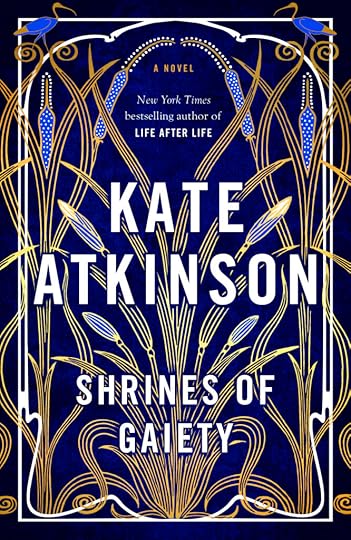
Shrines of Gaiety by Kate Atkinson is a historical novel set in 1926 London. I’ll read anything by this author, and this book was a real pleasure. Two (or more) plots intersect here. We begin with a woman being released from prison. Nellie Coker is an owner of a group of nightclubs that frequently run afoul of the law for various reasons, and a new police inspector has been brought from Scotland Yard to shake things up in the city’s underworld. But also, a young girl from York arrives in the city in hopes of breaking into the theater. When her family loses contact with her, they ask a former librarian who is at loose ends to go looking for her. That leads her to the police inspector and, ultimately, the night club scene. It’s all very entertaining and beautifully written.
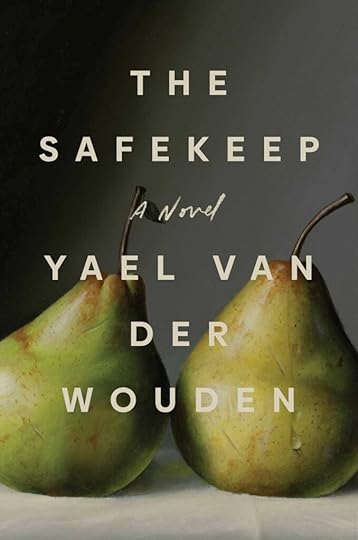
The Safekeep by Yael van der Wouden was the selection of an International Book Club I participate in. The author is Dutch, although she wrote this novel in English. The story is set in 1961 while The Netherlands is still healing from World War II. It centers on Isabel, who occupies the family home that she and her brothers had moved to with their mother to escape the dangers of Amsterdam during the war. Isabel has been traumatized—by the war and then her mother’s death—and seems to be quite neurotic. Her brothers have their own problems: one is a serial womanizer and the other had been cast out of the family because of his homosexuality. Then a young woman, Eva, comes into their lives. How and why and what then happens provides the book its depth and drama. While I thought the plot and the characters were very well done, the dialogue—characters are constantly interrupting themselves and others—was frustrating. Still, the book has garnered some major prizes and is worth reading.
June 25, 2025
Between Books

I’m writing a new book. I’m almost at the end of a first draft and already looking forward to the revision process. No, really. I have a lot of ideas for what I need to add to the draft to bring it closer to my original vision for the project.
Still, I’m in an odd place. For many years—more than a decade—I had a finished book that I was submitting to agents or publishers, or I was promoting a book that had just been published. I was almost never “between” books, like I am now.
When my first book came out in 2009, my second book was already finished and in the hands of my agent. When that book came out, I was looking for a new agent for my third book, which was done. It took a while to get an agent for it, and then it took a few years to find a publisher. By the time it was published, I had contracts for books four and five and was working to edit those manuscripts to prepare them for publication. The fourth book came out in 2020 and the fifth in 2021, and by then I was very close to being done with book six. I signed a contract for that one in 2023 and it came out in 2024.
At that point, I barely even had an idea for a new project. The seed for it had been planted during a trip to Europe in the fall of 2022, but it hadn’t quite germinated yet. In 2024, while I was promoting my sixth book (The Last Bird of Paradise), I toyed with some ideas on the page, but it wasn’t really going anywhere.
What got me going, finally, was being invited to join a critique group. We are a group of six writers, all published by the same publisher, and we meet weekly to discuss our work. The feedback I’ve received from these writers on my work-in-progress has been very helpful, but even more valuable has been being held accountable. I have to produce pages to share with the group every other week, and so I do. Which is how I’ve managed, finally, to get near the end of a first draft.
To learn more about my books and find links for ordering them, please visit the Books page on my website.
June 24, 2025
Squirrels in the Attic

Some time ago, I noticed two things at my house, which is out in the country surrounded by lots of trees. Inside, I was hearing noises above my head–especially when I was in my office on the second floor–and outside, a hole had appeared under the eaves (in the “soffit” as I now know to call it) just outside and above my office window.
Diagnosis: A squirrel or squirrels had taken up residence in my attic. (I don’t have an attic per se, but there is space between my gabled ceiling and the roof, plus a crawl space along the wall.) The sounds were especially pronounced during the winter. Too cold for the squirrel to go outside, I assumed. I dithered about what to do and ended up doing nothing.
I knew, of course, that the squirrel(s) could be doing damage up there, but I was experiencing true magical thinking. The squirrel would go away eventually, I thought.
It didn’t.
I considered several options. I bought some squirrel repellent—a pepperminty confection that supposedly keeps them away. The problem with that was I didn’t have a good plan for how I would get the stuff in the hole, nor did I know how I would patch the hole once the critter was gone. I also bought two small traps, thinking I would catch the squirrel and take it far, far away. That would still leave me with the hole to deal with, but at least I wouldn’t have the noise. The traps included a warning to check the laws in your locality about relocating animals, which I finally did. It turns out that Virginia law prohibits doing exactly what I had planned to do. Assuming there must be an exception for homeowners in my situation (more magical thinking), I decided to proceed with the trapping and relocation plan.
I baited the traps with apples and set them on the ground under a big tree in sight of the hole. Nothing happened all day, but when I looked outside the next morning, I saw that both traps had been flipped over and the apple slices were gone. The next day I reset one of the traps, configured so it couldn’t easily be flipped, and baited it with walnuts and peanut butter. Again, nothing happened all day, but the next morning, I looked out and saw I had caught something!
Not a squirrel, though. A possum had triggered the trap—which was several sizes too small for it—and was now stuck inside, contemplating its predicament. I know possums are harmless and actually helpful animals, so I knew I needed to free the little fella as soon as possible. I managed to open the trap door, but the possum just glared at me and didn’t budge. So I went away and checked periodically, until, several hours later, I saw the trap was empty. Retrieving the trap, I found that the possum had wrecked its mechanism—as noted, it was too big for this trap—and it was no longer usable. Although I still had the other trap, I decided to wait before deploying it.
Finally, I called a wildlife control company, and they provided me with a solid plan: they would install a one-way door over the hole and reinforce some other potential entry points into the attic. The squirrel(s) would exit and not be able to get back in. Once the visitors were evicted, the firm would replace the one-way door with a patch to cover the hole. This was not a cheap proposal, but I realized it was my best option.
A few days later, a couple of men showed up, installed the one-way door and reinforcements, and instantly there was no more noise above my head. Very possibly, the work was done while the squirrel was out doing what squirrels do and then it couldn’t get back into the attic. Or it left after the door was installed. Either way, no more squirrels. (Later, I saw a couple of squirrels running around the yard in what I imagined was a panic, having lost their home and all of their possessions.)
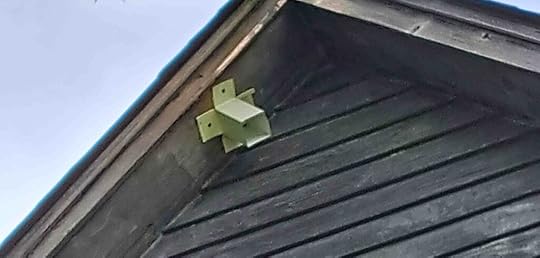
June 9, 2025
I’ve Got Questions for Alex Poppe
Editor’s Note: This exchange is part of a series of brief interviews with emerging writers of recent or forthcoming books. If you enjoyed it, please visit other interviews in the I’ve Got Questions feature.
What’s the title of your book? Fiction? Nonfiction? Poetry? Who is the publisher and what’s the publication date? Breakfast Wine by Alex Poppe
Breakfast Wine by Alex PoppeMy book is called Breakfast Wine: A Memoir of Chasing an Unconventional Life and Finding a Way Home. It’s a memoir-in-essay, to be published by Apprentice House Press on June 10, 2025.
In a couple of sentences, what’s the book about?Braiding the geopolitical and intimately personal, Alex Poppe’s memoir, Breakfast Wine, plumbs the depths of yearning. As an English language instructor and humanitarian aid volunteer in Iraq, Poppe chases adventure, purpose, agency, and belonging while confronting America’s nebulous role in the world. In fierce yet lyrical language and inventive structure, Poppe captures the resilience of the human spirit and the search for identity amidst chaos. By turns laugh-out-loud hilarious and deeply tender, Breakfast Wine reflects Poppe’s thirst for living an authentic life while staying true to her nomadic nature.
What’s the book’s genre (for fiction and nonfiction) or primary style (for poetry)?Memoir-in-essay
What’s the nicest thing anyone has said about the book so far?Booklist gave it a starred review, saying: “With machete sharpness and magical imagery, Poppe extols the allure and apprehension of Kurdistan’s people as she embraces their culture and attempts to prepare them and herself for an uncertain future. A joyous, sobering, and spirited memoir of place and the chance encounters that can shape a lifetime.”
What book or books is yours comparable to or a cross between? [Is your book like Moby Dick or maybe it’s more like Frankenstein meets Peter Pan?]Breakfast Wine is comparable to Emergency Sex and Other Desperate Measures, by Andrew Thomson, Kenneth Cain, and Heidi Postlewait, which hugely inspired my pivot away from acting and into humanitarian aid. Suzy Hansen’s Notes on a Foreign Country was another influential book. A more recently published comparable title is Jenny Erpenbeck’s Not a Novel: A Memoir in Pieces.
Why this book? Why now?Breakfast Wine shows the resilience of women and youth post-conflict. As our country becomes increasingly polarized and the information ecosystem gets more and more polluted with mis/dis/malinformation, my hope is that reading Breakfast Wine will encourage curiosity and empathy for “folks over there,” especially those being vilified in our current political discourse. One of Breakfast Wine’s main themes is this concept of home; what ties us to a place? What unties us? How do you make sense of a war-interrupted life?
Other than writing this book, what’s the best job you’ve ever had?I am really proud of and grateful for the opportunity to teach in Kurdistan, Iraq. I’ve taught in eight countries, and students are great everywhere. It’s the institutions around them that succeed or fail. Yet there’s a singular sweetness to students in the Middle East, be they Kurdish, Iraqi, Syrian, or Yazidi. Writer and theologian Frederick Buechner theorized that we find our true vocation where our deep gladness meets the world’s great need. I found deep gladness and joy in those classrooms.
What do you want readers to take away from the book?I hope readers gain a new perspective on Iraq, different from what is portrayed in cinema or even on mainstream media. Three-time Nobel Peace Prize nominee Kathy Kelly has reviewed Breakfast Wine on Goodreads writing, “What can change people’s minds? What will make people refuse and resist wars? Alex believes in the power of stories. Her impassioned writing in Breakfast Wine will roil the waters, fueling concern, evoking laughter, and touching ‘the deep heart’s core.’ Readers will find, in Breakfast Wine, an unusual contribution to anti-war literature and a lively call to uphold human rights.”
What food and/or music do you associate with the book?Sia’s “Titanium” gave me the literal last paragraph of the book. I associate an alcoholic beverage called a latino with northern Iraq, oddly enough, because it is the only place I have ever had them. The are made with a shot of tequila drowned in a pilsner and topped off with a generous pour of fresh lemon juice. The glass can be rimmed with salt and/or sumac.
What book(s) are you reading currently?I am reading the gorgeously heartbreaking The Hollow Half by Sarah Aziza.
 Alex Poppe
Alex PoppeLearn more about Alex on her website.
Follow her on Instagram or LinkedIn
Buy the book from Amazon or Bookshop.org.



